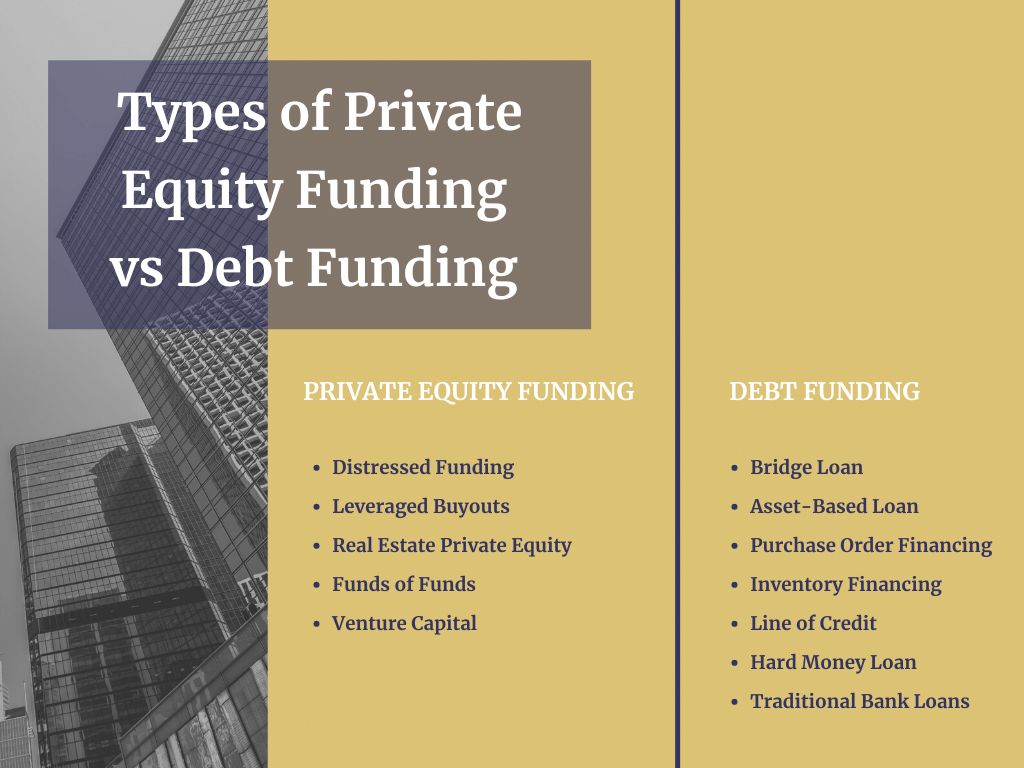When it comes to financing your business, there are a few different options available. Well-established companies seeking funding for growth or acquisition require a different type of financing than startups require. Depending on the company’s valuation, equity, and length of time as a business, there are different types of funding options available. Let’s dive into your different funding options: private equity funding, venture capital funding, and debt funding.
Private Equity Funding
One type of alternative funding is private equity funding. This method is funded by private companies and investors, typically private equity firms that invest in the company through buyouts– not publicly traded stocks.
These buyouts strip the company requesting the loan itself of their majority hold of equity. They give their shares in order to obtain the capital necessary for the ongoing projects to increase growth and revenue. Investors partnering in private equity investments obtain control of equity in the company in the form of the agreed-upon amount of equity and then hold the decision-making authority.
A company receiving private equity funding loses control as the primary stakeholder of the company itself. The Limited Partners (LP) and General Partners (GP) obtain primary control. In turn, the company seeking a loan will receive the capital to fund projects and acquisitions to expand the business. There is not a requirement of repayment for the funds received in exchange for the private equity funding,
Private equity funding benefits companies, especially startups because they have easier access to liquid assets without worrying about high traditional loan interest rates or public market fluctuations. They also have the opportunity to have a more personal relationship with their LPs and GPs invested in the company.
The disadvantage of private equity lies in that it does not have a set rulebook. The company must find buyers to sell the investment or company to produce the liquid assets. Since the company doesn’t rely on the public market, buyers and sellers are not as easily matched. The agreements between buyers and sellers also rely on negotiations between the two instead of the market rate itself.
Different types of private equity include:
- Distressed funding- Funding meant for companies experiencing underperformance and needing assistance.
- Leveraged Buyouts – This popular form of private equity funding completely buys the company with the goal of improving revenue and selling it for a profit.
- Real Estate Private Equity – Commercial real estate and real estate investment trusts capitalize on this type of private equity as they require higher minimum capital for investments.
- Fund of funds- This investment distributes funding to company funding such as hedge funds or mutual funds.
- Venture Capital – Funding is typically given to newer businesses to assist in scale and growth.
Venture Capital Funding
Venture Capital Funds are a type of Private Equity funding. As mentioned above, startups and newer businesses are typical recipients of venture capital funding when they have high long-term growth potential. They are categorized as high-risk/ high-return investments.
They are great opportunities for starting companies since 38% of new companies fail due to insufficient capital, 19% fail due to flawed business models, and 15% fail due to pricing and cost issues. Venture capital investors have the monetary resources to supply sufficient liquid assets for the company and provide business expertise to pivot the company in the right direction.
These upward projecting companies, usually startups less than two years old, partner with investors early on in the life of the startup in the hopes that the potential for the company’s worth reaps high rewards in time.
However, venture capital investors have a higher risk of working with startup companies because they are unpredictable and not well established. According to Review42, “90% of new startups fail. 75% of venture-backed startups fail. Under 50% of businesses make it to their fifth year. Only 40% of startups actually turn a profit.”
Considerations for entrepreneurs seeking venture capital funding for startup businesses are that equity of the company is given to the investor in exchange for capital and expertise. Depending on the percent given to the investor, they have the potential to control the primary decision-making of the company. Either way, their equity in the company allows the investor decision-making authority.
At times, receiving venture capital funds entails giving away a note detailing that when the company receives a valuation, the venture capital investor is entitled to more stock at a reduced price because they invested in the company early on.
Debt Funding
Debt funding also provides financial support to businesses without requiring a stake in the company’s equity. Instead, debt funding requires repayment of the monetary sum received with interest over time.
The company owners retain control of their business without relinquishing equity to those supplying the loan. For business owners looking for smaller sums of capital for company growth, it’s a great alternative to grow a business without losing equity. It also typically costs less than equity financing. Payments made can be tax-deductible depending on the type of debt funding option. However, repayment will exceed the total borrowed due to interest rates and may be a riskier venture for businesses with inconsistent cash flow that need to make consistent payments.
There are different types of debt financing available.
- Bridge Loan – A short-term loan covers financial costs between two transactions. They are associated with higher interest rates and shorter terms. Typically, they are used during real estate funding.
- Asset-based loan- the borrower’s assets, such as buildings or equipment, are used as collateral rather than a credit score. If the borrower fails to repay the loan, the assets serve as payment to the lender.
- Purchase order financing- companies in need of financing due to increased product demand for purchase orders will receive the capital needed to fund the increased demand.
- Inventory Financing- this loan covers the costs associated with purchasing inventory or supplies. If a company does not have the capital to purchase necessary inventory, they can receive an inventory financing loan to purchase necessary resources for later use.
- Line of credit – this loan mirrors credit card transactions and payments. The company can use up to the approved credit amount, paid back with interest as many times as needed. When the amount is paid back, the credit limit returns for future purchases.
- Hard money loan – similar to an asset-based loan, this loan is secured by property and most commonly used during real estate transactions. For short-term loans you know you can pay quickly, these are a beneficial option despite higher interest rates.
- Traditional Bank Loans – these loans are funded by banks. They are typically more difficult to obtain due to their set regulations. While they have lower interest rates than other lending options, they can be more difficult and take longer to obtain.
When choosing a debt funding option, consider the type of loan, amount, and duration of the loan needed. Low-interest rate loans, like traditional bank loans, usually have longer repayment periods than those with higher interest rates. They can include penalties for early repayment because the lending institution is cut short of the interest they would have received over time. Understanding terms associated with loans is just as important as the interest rates themselves.
Here at Innovative Capital, we have the diverse resources to partner companies with the right lender for your business needs. Whether it’s with private equity lenders to debt lenders, our team of expert loan officers sources your unique borrowing needs to our network to find you the best deal. It cuts the time it takes to apply to each loan individually and leverages offers in your best interest. Learn more by speaking with our team today.
Curious about the difference between alternative financing and traditional financing? Read our article that explains the two.



